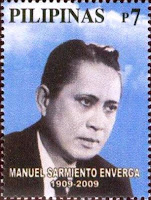Manuel S. Enverga on Stamps

Dr. Manuel S. Enverga, founder: president of the Luzonian University which he converted into a foundation that now bears his name, the Manuel S. Enverga University Foundation in Lucena City, and Representative of the First District of Quezon from 1953 to 1968, spent the remaining years of his retirement from politics nurturing the growth of the higher education institution he founded to provide affordable, relevant, and quality education to his countrymen and to write about his vision for the country, foremost of which was to advance the nationalist cause .
A staunch nationalist, Congressman Enverga authored the change of the celebration of Independence Day from July 4 to June 12 which President Diosdado Macapagal adopted and signed into an executive order. He also spearheaded the reexamination of Philippine foreign policy to open trade, scientific and economic cooperation with socialist countries to reduce dependence on the traditional American market, an advocacy that was clearly ahead of his time. Congressman Enverga has advanced the nationalist cause to a remarkable degree by the sober way in which he spearheaded the move to make foreign policy long shackled to antiquated but no less dangerous cold war myths responsive to the realities of the 1960s.
One of his major speeches in the House of Representatives which dwelt on the military danger and economic disadvantages posed by the American bases in the country has earned the praise of his more enlightened colleagues in the intellectual community. Congressman Enverga has also conceptualized the archipelagic principle that has now been enshrined in the definition of the country’s boundaries under the Philippine Constitution. He was born on January 1, 1909 and celebrates his centenary on January 1, 2009.
The stamp was issued on January 5, 2009






